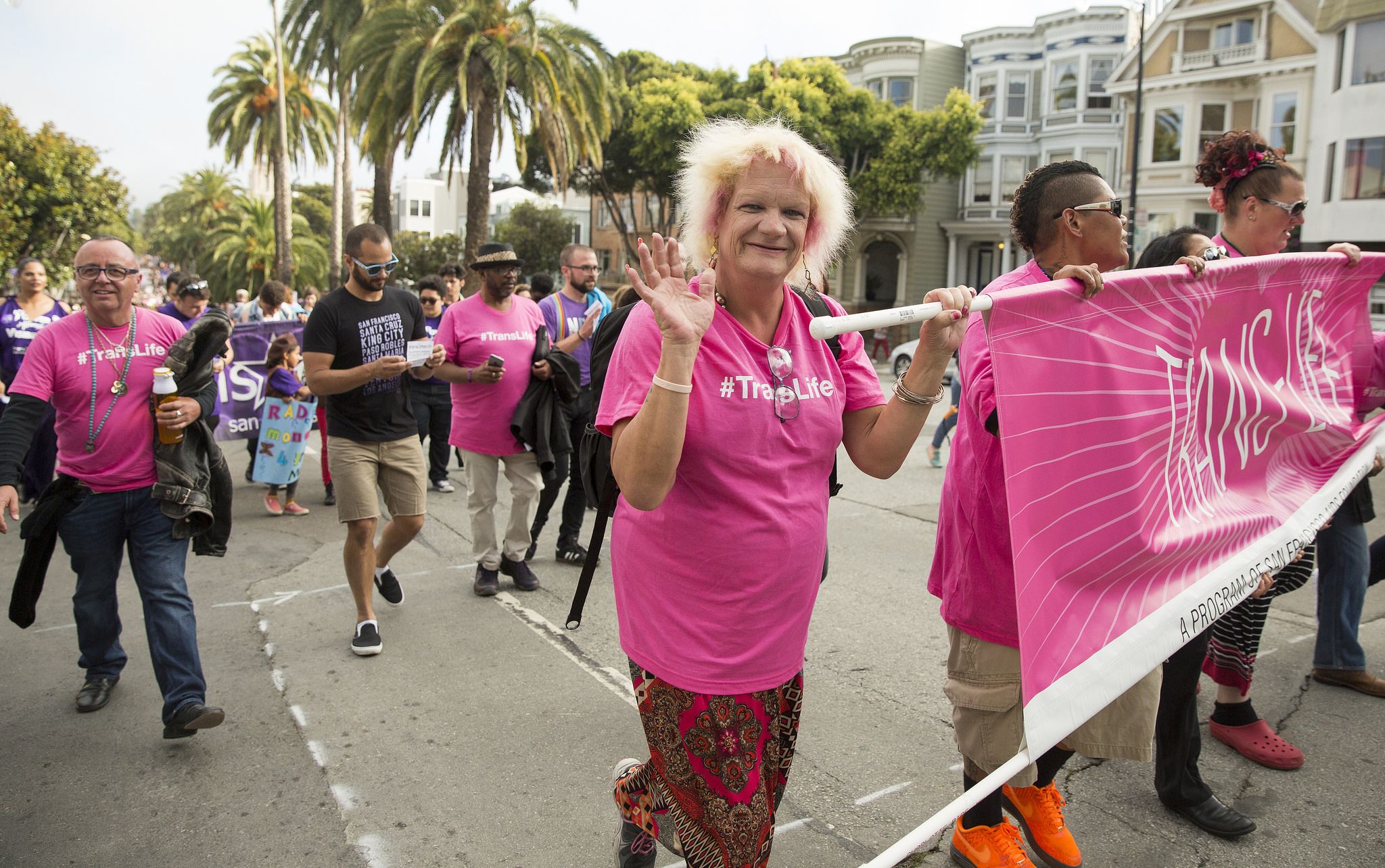In the days following the election, transgender people and their allies began planning for possible disruptions in their ability to live life as normal under a Trump Administration. For some, that meant taking steps to change names and gender markers on identifying documents in case policies were changed to make that more difficult. Legal advocates saw an “explosion” of clients seeking help and advice, according to Sasha Buchert, a trans woman and attorney at the Transgender Law Center in Oakland, CA.
Others began formulating contingency plans for acquiring essential hormone medications.
Videos by VICE
In the US, 18 states require that insurance companies cover hormone treatment and surgery for transgender people who experience gender dysphoria, in which someone’s assigned gender doesn’t match their gender identity. States also have their own medical assistance programs, like California’s Medicaid, which cover this.
“Strides made by President Obama to make sure that trans people have health care will be erased by this administration.”
But in more conservative states with laws that allow insurance providers to exclude transgender people, Trump’s promises to dismantle the Affordable Care Act, which covers the hormonal treatments and surgery, have created shockwaves of concern. Right now, the Affordable Care Act is a stop-gap. It requires federally-funded health care providers to provide hormone treatment and surgical care to transgender people, just like they do for non-trans people. If it went away, people in conservative states would be more vulnerable to the whims of local politics.
“There is a huge concern that the hard-won expansion of [health care] coverage we’ve seen in our communities will be lost, that strides made by President Obama to make sure that trans people have health care will be erased by this administration,” Buchert said.
Some trans people and advocates got on Facebook and posted (and reposted) instructions for stockpiling hormones. The posts weren’t organized by a campaign, but there were multiple threads, according to another transgender attorney I talked to and posts I’ve seen on a women’s group page with hundreds of members. The posts advocated that cisgender women stockpile certain types of birth control that could, if necessary, help a trans woman maintain her hormone levels if she had trouble getting a normal prescription. Upon investigation, though, the science behind those posts was shaky.
Here’s one that came up on my own Facebook feed:
“Cis women and afab trans people who care about trans women, if you are still able to access this when the dust settles, please consider getting a Rx for estradiol-only birth control, not for yourselves (unless that’s what you use) but as a way to help the many trans women who are going to use their hormones.
Anyone who can get a Rx for it, please consider getting spironolactone for ‘acne’ or for your ‘blood pressure.’
PLEASE COPY/PASTE. We need to start thinking about these kinds of seemingly little things, especially given how many of us are dependent on the ACA Medicaid Expansion.”
There are two main things that male-to-female trans women need to do if they want to use hormones to transition: block testosterone and take some estrogen (trans men, by contrast, mainly need to take testosterone).
Unfortunately, some of the posts, including the one I saw, contained faulty or vaguely illegal suggestions.
First, there are no estradiol-only birth-control pills, at least not in the US, according to two medical specialists I spoke to, including Joshua Safer, the medical director of Boston University’s Center for Transgender Medicine and Surgery. Safer said he was aware of reports of some high-dose estrogen birth controls being used in the Netherlands.
Second, getting prescriptions for someone else is technically illegal. Milo Manopoulos Beitman, a trans man and an Oakland-based attorney I spoke to, said he had seen a similar post and several others like it on Facebook. He immediately liked and reposted one of the similar calls to action he saw on his feed. But soon after, the questions began pouring in.
A couple of women told him that they would be happy to stockpile birth control but weren’t sure how to connect with trans women who needed it. Other friends questioned if birth control would actually contain enough estrogen to give trans women the hormone levels they need. Yet another friend suggested that Manopoulos take the post down, because sharing prescriptions is against the law.

San Francisco Pride March 2015. Image: James Buck/Flickr
“It seemed like such a good idea in the moment, but ultimately I took the post down,” Manopoulos said.
Third, according to Safer, it could be unhealthy for trans women to take hormones prescribed for cis women. There are simply better, safer medications for them with less side effects. Of course, he said, if those weren’t available, taking someone else’s birth control and spironolactone would probably work—and it would be an understandable decision for someone who was unable to get hormones.
“I don’t want to be alarmist about it, because I’m not,” he said. “It’s not like people are gonna keel over but it’s the unhealthy choice [to do it that way].”.
Yet despite the risks, it isn’t unusual for trans people to want to pursue their own treatment outside the medical system, where some have experienced prejudice or ignorance, Dee Wollstonecraft Michel, a trans woman and transgender services coordinator at St. James Infirmary in San Francisco, told me.
“Right now the safest thing to do is pretend to be a mostly straight male instead of a mostly gay transwoman.”
“I know a lot of other trans women who have gone years and years without seeing a medical provider but have been taking hormones,” she said.
Hormones that foster male or female characteristics in the body can be prescribed by doctors, but the process to get them has varying degrees of hoops to jump through—depending on how easy or hard doctors in a given place think it should be for a trans person to begin the transition process—and how much vetting they believe doctors should do beforehand. So even if a person has health care coverage, the ease of getting hormones is intertwined with local politics and beliefs about trans people.
Speaking about doctors who adhere to the more stringent standards, called “WPATH,” Wollstonecraft Michel said, “(Those) standards are set forth by cisgender doctors that have pathologized transgender people’s bodies.”
Fear has hit a fever pitch since election day, as seen in the range of answers to the following question on the “MtF” (male to female) subreddit.
“I’m going to lose my dad’s health insurance when [Obamacare] is repealed.” a user called zoebytes said. “There’s a good chance that my dad will refuse to pay for other insurance for me … I basically have to stay in school because that’s the only way I can see a therapist and a psychiatrist without insurance right now, and I don’t know if I’ll able to pay for school. I don’t even know if they do HRT [hormone replacement therapy] there…”
” I … wish it wasn’t this way and I don’t want to have to worry about getting my HRT or receiving medical attention,” slingbladerapture said.
Another user named BardicFire said they were thinking about putting off their transition for the foreseeable future. “Right now the safest thing to do is pretend to be a mostly straight male instead of a mostly gay transwoman,” they said.
If trans people followed the instructions I saw on Facebook and took the hormones described there, they’d be risking a host of side-effects. Estradiol can cause blood clots and isn’t as safe as other estrogen supplements, Safer said. And Spironolactone blocks testosterone but can cause increased potassium and heart rhythm problems.

Image: Shutterstock
Websites, discussion boards, and online pharmacies have popped up to fill-in where medical professionals have lagged, though Safer said they’re often plagued by misconceptions that get slowly corrected over time.
Safer said that there are two main problems he sees with DIY.
“The risks are, number one, that you won’t get the product you think you’re getting and two, that you may overdose or underdose… [and] there’s no proof that taking a boat-load of hormones will get you extra benefits,” Safer said.
The range of options, the hostility of some medical providers, and the abundance of well-meaning, inaccurate information make navigating a transition challenging and full of potential missteps.
But Wollstonecraft Michel said that although things might get worse under Trump, she’s confident in the resiliency of her community.
“Trans people will keep doing what they need to survive,” she said. “It’s what we’ve been doing for decades.”




